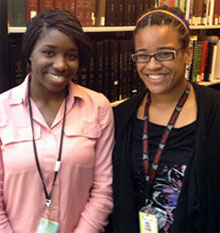AROUND THE DRILLFIELD

The cover of the fall 2010 issue of Virginia Tech Magazine featured three members of the Virginia Tech Carilion School of Medicine's first class. Recently, we followed up with the three students, now two years into their med-school journey.
Virginia Tech Carilion School of Medicine and Research Institute »
The Virginia Tech Carilion School of Medicine is one step closer to full accreditation. The Liaison Committee on Medical Education (LCME) granted the school provisional accreditation, the third of four stages in the process. Following a three-day visit in January, LCME determined that the school has met the prescribed standards in the areas of curriculum, educational resources, student affairs and admissions, faculty affairs, and institutional setting. The school will be eligible for full accreditation when its charter class graduates in the spring of 2014.
Virginia Tech has established a new Center for Drug Discovery to accelerate research that could lead to new treatments for cancer, Alzheimer's disease, cardiovascular disease, atherosclerosis, diseases of the central nervous system, and parasitic diseases such as malaria and Chagas disease. The center is intended to be a major force in drug discovery and delivery in the U.S.
A paper on an economically feasible way to store solar energy in existing residential power networks earned Reza Arghandeh, a doctoral candidate in the Bradley Department of Electrical and Computer Engineering, the best student paper award at the 20th International Conference on Nuclear Engineering, held in conjunction with the American Society of Mechanical Engineering Power 2012 Conference. His advisor is Robert Broadwater, professor of electrical and computer engineering, who specializes in electric power system analysis and design.
In their paper, Arghandeh and Broadwater acknowledge that solar energy resources are "intermittent, seasonal, and non-dispatchable." However, the current national climate with its deregulation policies, electricity tariffs, control strategies, and demand management are "significant tools for flexible and resilient operation of power systems with photovoltaic adoption levels."
 These kitchens are truly one-of-a-kind. Our students learn about designing these types of residential spaces by working with a variety of layouts and products. It's experiential learning at its best, and it's part of what makes our program at Virginia Tech so innovative."
These kitchens are truly one-of-a-kind. Our students learn about designing these types of residential spaces by working with a variety of layouts and products. It's experiential learning at its best, and it's part of what makes our program at Virginia Tech so innovative."

In a letter to university President Charles W. Steger in August, Vice President of Administrative Services Sherwood Wilson recommended accepting the recommendation of an advisory committee not to locate an indoor football practice facility in the originally proposed location, the Stadium Woods area directly behind the football practice field. Wilson has directed his staff to "evaluate the options presented by the committee, as well as any other potential sites that may be appropriate." The university does not plan to take action on another request from the committee to place the woods in a conservation easement or to give a special designation to the property. President Steger has accepted both recommendations.

The Walter Reed Army Institute of Research hosted two programs associated with the U.S. Army's Educational Outreach Program, which manages a host of outreach programs through a cooperative agreement lead by Virginia Tech's Office of Outreach and International Affairs. One is the Gains in the Education of Mathematics and Science (GEMS) program. Titi-Mary Omotade (biology, history '12) worked with high school student Morganne Kelliebrew this summer as part of the program. Omotade got involved with GEMS in her freshman year at Tech. "Education and science—it was perfect," Omotade said. She has signed a two-year contract to work in another Army lab conducting research into anthrax, plague, and other potential biological threats.
Virginia Tech ranked in the top 20 in six categories of The Princeton Review's 2012 college rankings lists. Tech was ranked second in "Best Campus Food," third in "Their Students Love These Colleges," fourth in "Town-Gown Relationships Are Great," sixth in "Best Quality of Life," and 18th in "Best Career Services" and "Students Pack the Stadium."
The newest minor in the College of Agriculture and Life Sciences blends classroom and hands-on learning about the food production process.
Students pursuing a minor in civic agriculture and food systems learn about sustainable agriculture, the food production process, and food sovereignty (the trend of moving away from an industrialized, market-driven food system toward local community farms). Students are required to complete fieldwork in addition to classroom assessments. The program had 21 students its first semester. Two years later, there are 44.
The National Science Foundation (NSF) has awarded a three-year, $999,531 grant to Virginia Tech to use the tools and methods of industrial engineering to optimize the laboratory processes used to make custom DNA molecules. A transdisciplinary team led by Jean Peccoud, an associate professor at Virginia Bioinformatics Institute, will focus on DNA synthesis. The project will also provide unique cross-disciplinary training for undergraduate and graduate students and post-grad fellows.
At its quarterly meeting held Sept. 10, the Virginia Tech Board of Visitors approved a resolution that will enable the university and the Virginia Tech Foundation to begin development of an approximately $3.5 million propulsion laboratory at the Virginia Tech Corporate Research Center. Operated by the College of Engineering, the facility will support propulsion research, including next-generation fighter and commercial aircraft engine technology and gas-turbine technology. The specialized facility and equipment will distinguish Virginia Tech as a leader in propulsion research.
Scott F. Midkiff, professor and head of the Bradley Department of Electrical and Computer Engineering, will become the university's vice president for information technology and chief information officer in October. Midkiff arrived at Virginia Tech in 1986 and developed and taught undergraduate and graduate courses in networking, wireless networks and mobile systems, network applications, and telecommunications. He was appointed head of the Bradley department in 2009.
Marc Edwards, the Charles P. Lunsford Professor of Civil and Environmental Engineering, received the Carl Barus Award for Outstanding Service in the Public Interest from the Institute of Electrical and Electronics Engineers' Society on Social Implications of Technology. The award honors Edwards' tireless effort to expose safety and quality problems in the nation's public drinking water supplies, specifically in Washington, D.C. While researching metropolitan water- distribution systems, Edwards found that many homes in the nation's capital were receiving water contaminated with lead leached from city pipes to an extent far exceeding acceptable industry levels.
Joseph Baker, assistant professor and Steven O. Lane Junior Faculty Fellow of Electrical and Computer Engineering, will use a five-year, $480,000 National Science Foundation Faculty Early Career Development Award to study inter-hemispheric space weather connections. "Space weather" refers to dynamics in the near-Earth space environment that can have serious impacts on technological systems such as satellites, electrical power grids, global positioning systems, and communication networks for cell phones and more.
Thousands of engineering students seeking industry internships and jobs attended this year's Engineering Expo, hosted by the Student Engineers' Council in September. For the first time since 2008, the event sold out, with 274 firms and government agencies coming to campus, said Ben Drew, chairman of the expo committee and a mechanical engineering major.
In one of the first-ever studies conducted in a real-world setting with children's meals, Virginia Tech researchers found that children and parents who are dining out may make healthier food choices when they are shown the "nutrition bargain price" of food. The nutrition bargain price menu shows the nutritional value of food in real dollars.
The Virginia Tech study also illustrates that people's eating decisions are more influenced by a message that expresses the information in a well-understood unit (dollars) with an immediate observable impact (cost), rather than in unclear units (calories) with uncertain future impacts. The change in ordering patterns could play a role to help establish a food-labeling system that could contribute to counteract the obesity epidemic in the United States.Virginia Tech researchers and Extension agents are working across the commonwealth not only to find a way to control the brown marmorated stink bug, but also to keep it from spreading farther around Virginia and to other southern states.
Since found in Virginia in 2004, the insects have caused millions of dollars in damage, destroying apples and grapes in the Shenandoah Valley, piercing soybeans in north-central fields, and sucking the proteins and carbohydrates out of corn, tomato, green bean, and pepper plants in other areas of Virginia.
This year, stink bugs have been discovered in 20 counties in Virginia, and they are expected to continue to spread throughout the state, infecting more localities than ever before.
Across the university and commonwealth, researchers are investigating the bug's biology and habitat; pesticide levels; the impact on tree fruit, wine grapes, berries, corn, and more. The stink bug's appetite is as varied as it is voracious. As much as 20 percent of the vegetable crops in Northern Virginia were lost to stink bugs in 2010.
Pamplin College of Business grads are highly sought after, if the numbers are any indication. In 2011, Pamplin's graduate employment rate ranged from 70 to 90 percent. The college helps students prepare for the real world through job search resources and its annual career fair. Last fall, nearly 2,000 students and 150 organizations attended. Virginia Tech was also ranked the 13th best campus for college recruiting in the U.S. by a Wall Street Journal survey.
With the enrollment of hundreds of new first-year students who have yet to pick a major and many returning students seeking to change majors, Virginia Tech hosted the annual Majors Fair to share academic opportunities with students. The Office of Undergraduate Advising and Student Government Association co-hosted the September event. Representatives from all of the undergraduate colleges and most of the university's majors were on site to answer student questions and discuss prerequisites and change of major requirements.
Virginia Tech ranks 28th among the top 30 public national universities in U.S. News and World Report's survey of undergraduate programs. The College of Engineering was ranked 16th, and the Pamplin College of Business ranked 40th. Virginia Tech also ranked among 33 universities named as having outstanding "undergraduate research and creative project" programs specifically targeting first-year students.